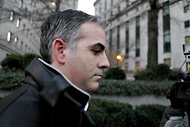 David Karp/Associated PressAnthony Chiasson, the former hedge fund manager, faces insider trading charges.
David Karp/Associated PressAnthony Chiasson, the former hedge fund manager, faces insider trading charges.
Jurors were presented with a stark choice in the insider trading trial of two former hedge fund managers. The defendants were either the senior links in a “corrupt chain” of Wall Street traders, or scapegoats for the criminal conduct of their subordinates.
On Tuesday, a jury heard opening arguments in the trial of Anthony Chiasson, a co-founder of the now-defunct Level Global Investors, and Todd Newman, a former portfolio manager of Diamondback Capital Management. They are accused of conspiring with six others to earn roughly $70 million from illegal trading in technology stocks.
The other six defendants have pleaded guilty and are cooperating with the prosecution. Two of the six, Jesse Tortora, a former Diamondback analyst, and Spyridon Adondakis, who goes by Sam, a former analyst at LevelGlobal, are expected to be the government’s main witnesses.
They “will paint a picture of a corrupt network of professionals who chose to break the rules and to trade on inside information all in order to make a quick buck,” said Richard C. Tarlowe, a prosecutor.
Yet the defense spent much of Tuesday attacking the credibility of the government witnesses. “The biggest mistake Todd Newman ever made, and the reason he’s sitting here today, is because he hired Jesse Tortora,” Stephen Fishbein, a lawyer representing Mr. Newman, said in his opening statement.
“Sam Adondakis is an easy, practiced liar,” said Reid H. Weingarten, a lawyer for Mr. Chiasson. “His word cannot be trusted.”
Early this year, federal prosecutors in Manhattan charged the eight Wall Street traders with participating in a “tight-knit circle of greed” that relied on secret financial information provided to them by corporate insiders at the computer company Dell and the chip maker Nvidia.
The trial, in Federal District Court in Manhattan before Judge Richard J. Sullivan, is expected to last six weeks. If convicted, the defendants could be sentenced to at least 25 years in prison, though they probably would receive far less time.
On Tuesday, prosecutors described how confidential information moved “across a corrupt chain of people” and ultimately into the hands of Mr. Chiasson, 39, and Mr. Newman, 47. That information, Mr. Tarlowe said, gave the defendants “an unfair advantage over honest investors who were playing by the rules.”
The prosecution previewed several pieces of evidence, including e-mails and instant messages among the defendants and their analysts. The communications, according to the government, suggest that in 2008 the managers had secret information about Dell’s gross margin numbers, crucial figures in its earnings release. With access to those inside numbers, Level Global made $50 million and Diamondback about $2.8 million by betting against Dell stock before the company released its earnings, the prosecution said.
Lawyers for the defense spent much of their opening statements trying to distance their clients from those accused of being their co-conspirators.
Mr. Tortora and Mr. Adondakis, with a few of the other defendants, worked together earlier in their careers as technology industry analysts at Prudential Equity Group in San Francisco. Mr. Weingarten, a lawyer for Mr. Chiasson, said that the group referred to themselves as “the clique” and likened themselves to “Fight Club,” a 1999 cult film about a secret, underground fight club.
“The first rule of the fight club is that there is no fight club,” Mr. Weingarten said, paraphrasing a famous line from the movie.
The clique “traveled together, partied together, drank together, vacationed in the Hamptons together,” he said. “They were very close, and they shared information as well.”
But neither Mr. Chiasson nor Mr. Newman was part of this clique, and they were far removed from the original sources of inside information, their lawyers insisted. Instead, the two defendants were depicted as upstanding, hardworking portfolio managers whose investments were grounded in legitimate research.
Both defendants processed so much data over the course of a trading day, their lawyers said, that they would not have been aware of improperly obtained data. To underscore that point, lawyers for Mr. Newman showed the jury a slide highlighting how in a given year, Mr. Newman made 32,222 trades, or roughly 128 trades a day, in the stocks of 366 companies.
The defense lawyers said that Mr. Tortora and Mr. Adondakis had falsely accused their clients to protect themselves. In November 2010, Mr. Tortora had lost his job at Diamondback and was living in Florida. When F.B.I. agents knocked on his door and presented him with evidence of insider trading, his only way out was to help the government, Mr. Fishbein, Mr. Newman’s lawyer, said.
“Make Todd Newman a scapegoat so Jesse Tortora does not have to face the consequences of crossing the line,” said he said.
Mr. Weingarten urged the jury, which includes a dog walker and a retired postal worker, not to resent the extraordinary wealth of Mr. Chiasson, who is worth tens of millions of dollars.
“It’s crazy how we pay people in our society,” Mr. Weingarten said. He noted that his “beloved” New York Yankees paid Alex Rodriguez many millions of dollars a year, only to pinch-hit for him this year in the bottom of the ninth inning of a playoff game.
“In 2007, he made A-Rod kind of money,” Mr. Weingarten said, referring to Mr. Chiasson. “I know you will not hold his economic success against him.”
Article source: http://dealbook.nytimes.com/2012/11/13/defense-opens-insider-trade-case-with-attack-on-witnesses/?partner=rss&emc=rss
Speak Your Mind
You must be logged in to post a comment.